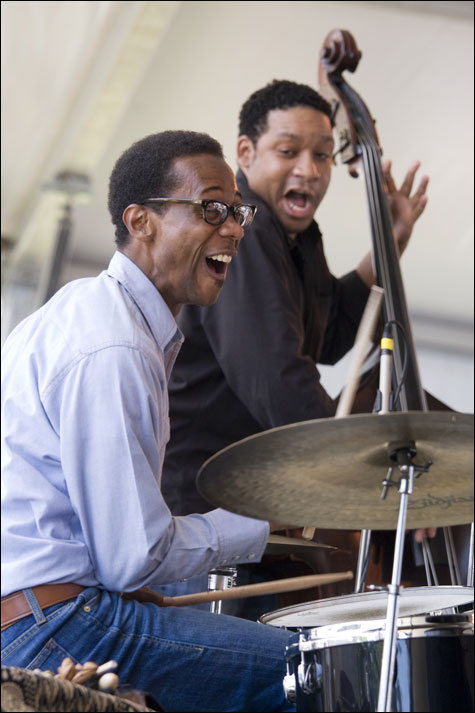
GROUP IDENTITY Blade’s Fellowship band are a resolutely ego-less bunch.
You could find just about any kind of jazz you wanted on the three stages at the JVC Jazz Festival in Newport last weekend: jazz as heavy metal (Marco Benevento Trio), jazz as twee prog (Jacob Fred Jazz Odyssey), jazz as history lesson (George Wein’s Newport All-Stars), jazz as avant-trad import (Empirical), jazz as pop funk (Herbie Hancock), jazz as magazine-cover glamor (Christian Scott, Esperanza Spalding), jazz as Latin diaspora (Guillermo Klein y Los Guachos), jazz as African bebop (Lionel Loueke), jazz as R&B (Aretha Fanklin), jazz as lingerie-buying background (Chris Botti), and jazz as jazz (Warren Vaché, Wayne Shorter, Sonny Rollins).

There were plenty of other spinoffs, but perhaps the most telling of any current trend was the post-rock contingent, which included Benevento, the Jacob Freds, Christian Scott’s quintet, and, most provocatively, the Brian Blade Fellowship. Blade is a first-call drummer among the jazz elite — he was also appearing at the festival as a regular member of the Wayne Shorter Quartet. But the Fellowship have been his pet project since their first disc in 1998. At the Pavilion Stage on Saturday, they played a chunk of their latest, Season of Changes (Verve). Led by Blade and composer/pianist John Cowherd, the line-up includes star guitarist Kurt Rosenwinkel, but this is a resolutely ego-less bunch. The songs suggest beautifully arranged and detailed folk rock, with carefully cued entrances and exits and layered, brooding themes.
The group ethic so predominates over the individual that the first song, “Stoner Hill,” was played straight through without a single solo. The Fellowship line-up also includes two crack reedmen — alto/bass-clarinet man Myron Walden and tenor-sax Melvin Butler — as well as one of the best drummers in jazz and a jazz-guitar visionary, so they can’t help sounding like jazz. But when you pretty much declare your indifference to the improvised solo, you’re discarding an idea that’s been central to the music since Louis Armstrong.
It hardly mattered — the Fellowship were compelling at just about every turn. Certainly the audience was unconcerned: the 500-plus who filled the chairs and overflowed the open sides of the Pavilion tent were rapt for the Fellowship’s 75 minutes on the stage. When Butler solo’d, it didn’t matter that his passage served more as a structural bridge than as improvised personal statement — the audience hooted and hollered anyway. By my watch, the first full-blown solo came from Rosenwinkel, nearly a half-hour into the set. (Although, as Ben Ratliff pointed out in his recent New York Times live review of the Fellowship, Blade improvises almost constantly.) Jazz is usually about how individual expression works within a band — but this project seems to be about the ensemble itself as a expressive statement.